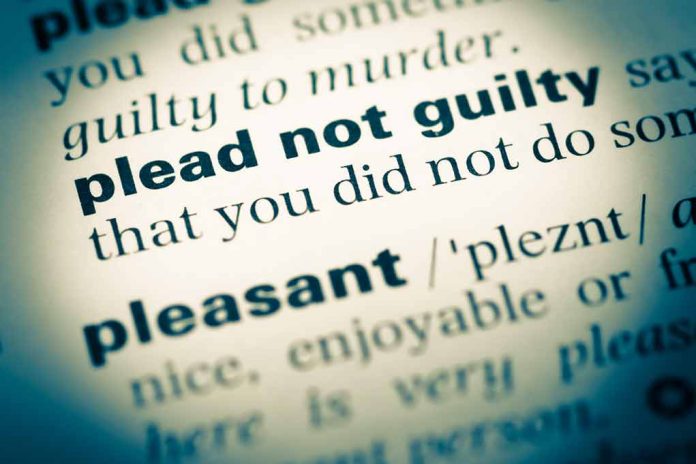
A man accused of attempting to assassinate former President Donald Trump at his Florida golf course has pleaded not guilty to federal charges.
At a Glance
- Ryan Wesley Routh pleaded not guilty to five counts, including attempted assassination of former President Trump
- The incident occurred on September 15 at Trump’s Florida golf course
- Routh was found armed with a high-powered rifle and a handwritten note detailing his plans
- If convicted, Routh faces a maximum sentence of life in prison
- This is the second attempt on Trump’s life in just over nine weeks
Courtroom Appearance and Charges
Ryan Wesley Routh, the man accused of plotting to assassinate former President Donald Trump, made his courtroom appearance on Monday. Dressed in a brown prison jumpsuit, handcuffed, and accompanied by two attorneys, Routh stood before U.S. Magistrate Judge Bruce E. Reinhart as the charges against him were read. In a brief hearing lasting less than five minutes, Routh acknowledged the charges and, through his attorneys, requested a trial by jury.
The five-count indictment against Routh includes attempted assassination, assaulting a federal officer, and three weapons violations. These charges stem from an incident on September 15 at Trump’s Florida golf course, where Secret Service agents discovered Routh armed with a high-powered rifle. The severity of the charges reflects the gravity of the alleged plot, with Routh facing a potential life sentence if convicted.
Ryan Wesley Routh Indicted for Attempted Assassination of Former President Trump
🔗: https://t.co/3jvvPTjPwh pic.twitter.com/iY2WtOnvAa
— U.S. Department of Justice (@TheJusticeDept) September 24, 2024
Details of the Alleged Assassination Attempt
According to federal prosecutors, the events unfolded when U.S. Secret Service agents spotted Routh near the Trump International Golf Club on September 15. Armed with a loaded rifle containing 11 rounds, Routh’s presence triggered immediate action from the agents. In the ensuing confrontation, agents fired at Routh, who then attempted to flee the scene without returning fire. The dramatic encounter led to a pursuit that ended with Routh’s arrest in a neighboring county.
The investigation revealed a handwritten note left by Routh, detailing his intentions and plans. This evidence, along with information suggesting Routh had been tracking Trump’s public appearances, formed a crucial part of the prosecution’s case. The discovery of the note and the circumstances of Routh’s arrest paint a picture of a premeditated attempt on the former president’s life.
Legal Proceedings and Security Concerns
As the case progresses, Routh’s defense attorneys have already made unsuccessful attempts to secure his release ahead of the trial. A federal judge, however, ordered Routh to remain in custody, underscoring the seriousness of the charges and potential risks associated with his release. The FBI continues its investigation, potentially uncovering more details about the alleged plot.
This incident marks the second attempt on Trump’s life in a short span, following a July 13 incident involving gunman Thomas Crooks at a rally in Butler, Pennsylvania. These events have raised significant concerns about the security of high-profile political figures and the challenges faced by protective services in safeguarding them from potential threats.
As the legal process unfolds, the case against Ryan Wesley Routh serves as a stark reminder of the ongoing security challenges in the political landscape. The next court date has not yet been announced, but the proceedings are expected to draw continued attention given the high-profile nature of the alleged target and the severity of the charges involved.







